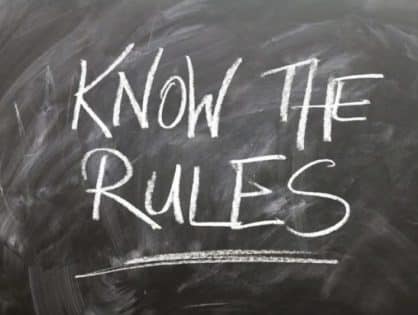What do professors mean when they say you need to know black letter law, or hornbook law? Black letter laws are the legal rules and principles that are so well accepted across the country that there is no longer any basic disagreement as to what they are. But keep in mind many states have slight variations on how they articulate the rules. Also, states may define certain key terms slightly differently. So when you become a lawyer, or if a professor asks for a certain state’s rule, make sure that you use the variation in your state.
With that slight caveat, no one would dispute, for example, that a tortious battery requires the intentional harmful or offensive contact of another. That is black letter law, as noted in my book on the intentional torts.
Law School Exams
Almost all law professors will require you to learn black letter law for exam purposes. This is because law schools, except in Louisiana and Puerto Rico, are preparing you to practice anywhere in the country. Also, the uniform portions of the bar exam will test you on these rules.
Many of you are wondering where to find these black letter rules. As I mentioned earlier, these rules are also called hornbook rules because you can find them in hornbooks. A hornbook is a book that attempts to capture the most important rules in a single area of law. Some examples include Criminal Law by LaFave, Torts by Dobbs, and Contracts by Perillo. The hornbook writers are able to determine the black letter law by reading cases and legislation from all fifty states, and then distilling them down into a single volume of law.
I do not recommend that students purchase hornbooks because they provide too much information for the typical student. One reason why the hornbooks are so big is because they have extensive footnotes to many cases and legislative enactments. I do recommend that you consider buying concise hornbooks, which condense hornbooks into a more readable size, for example, from 1,000 pages to 250 or 300 pages. For years I assigned concise hornbooks, along with a casebook, as the concise hornbooks provide the most important rules without going into detail about more obscure rules or minority positions.
Bar Exam
 If you are preparing to take the bar exam, the bar prep companies do a decent job in providing you with the black letter law. They do this by distilling the law found in hornbooks into something more manageable. But the law doesn’t always have a clear majority rule amongst the states. In that case, you are unlikely to find those rules on the uniform portions of the bar exam. For a few tips on what not to do more bar exam tips, check out this video on what not to do on bar exam day.
If you are preparing to take the bar exam, the bar prep companies do a decent job in providing you with the black letter law. They do this by distilling the law found in hornbooks into something more manageable. But the law doesn’t always have a clear majority rule amongst the states. In that case, you are unlikely to find those rules on the uniform portions of the bar exam. For a few tips on what not to do more bar exam tips, check out this video on what not to do on bar exam day.
Several years ago I noticed one of these unclear areas in tort law. So I called the National Conference of Bar Examiners, the group that creates the uniform bar exam. I was trying to figure out what rule they would use on the bar exam for that issue. I was told that they don’t test these areas because there is no broad agreement on the rule.
Dissents
Finally, keep in mind that your casebook will have a mix of black letter law and minority positions. This is done for various reasons, such as helping students see two sides of a legal problem or to provide you with a historical progression of a rule. In the words of Charles Evans Hughes: “ A dissent . . . is an appeal . . . to the intelligence of a future day, when a later decision may possibly correct the error into which the dissenting judge believes the court to have been betrayed . . . .” This article on dissents is lengthy but a good discussion on the importance of dissenting opinions.


